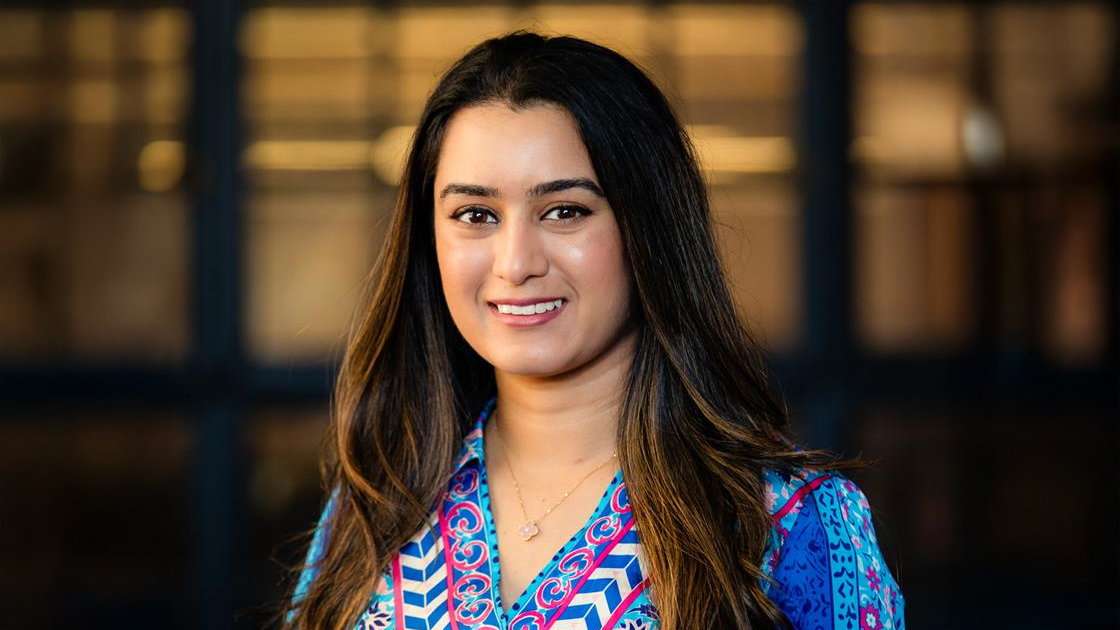Q&A: Alum explores how emerging tech is reshaping health care
Dania Ahmed ’13 BSPH ’17 MPH aims to empower women in data roles
By Kristen Mitchell

As a project manager at CoverMyMeds, Dania Ahmed ’13 BSPH ’17 MPH seeks to break teams out of the day-to-day grind to spark creative collaboration and solve problems. She is focused on how data and analytics can support strategic advancement and especially interested in supporting women in the field.
Ahmed, president of the College of Public Health Alumni Society, reflects on how a public health lens guides her work and shares her advice for current students.
Question:
What public health topics are you most passionate about?
What initially drew me to public health and what continues to inspire me is the profound influence our environment and access to resources have on how we experience health. My passion has evolved to focus on the intersection of public health and technology. I'm especially interested in how emerging technologies are reshaping the way we understand, deliver and experience health care.
This includes the way digital platforms shape the information we consume, including the spread of health misinformation as well as the risk large-language and other algorithm-based models pose as they increasingly tailor content to our existing beliefs, which could reinforce harmful biases. At the same time, I’m excited about the opportunities (to use) these technologies to personalize care, increase access and reduce disparities.
Question:
How did your time at the College of Public Health shape your career path?
The College of Public Health has been instrumental in connecting me to an incredibly supportive network of colleagues and mentors. As an undergrad, the college helped me secure a defining internship opportunity at the Kirwan Institute that transformed the way I think about public health.
As a recent graduate, I utilized the college's resources to reach out to alumni in various roles across Columbus for coffee chats. These interactions were so positive and taught me something new about how to translate the skills I'd gained as a student into a role in the workforce. After graduating, the college welcomed me back to contribute to research…to create personalized interventions and improve patient outcomes — an experience that eventually shaped my decision to pursue my master's and specialize in biomedical informatics. This desire to see others succeed is what sets CPH apart.
Question:
What is something you learned as a CPH student that has been useful in your career?
I learned the importance of looking upstream — focusing on the root causes of an issue rather than the symptoms. That mindset has stayed with me and continues to shape the way I approach challenges. Getting to the root of a problem requires deep listening, challenging assumptions and being willing to iterate until you land on the right solution.
Question:
Why do you think it’s important to get more women involved in data and analytics?
I'm passionate about mentoring women interested in data and other technical fields and empowering them to recognize and articulate the value they bring to teams.
The way we interpret and think about data — including AI — shapes the way we see the world and the decisions we make. This work is complex and nuanced. Women, beyond their technical expertise, bring intentional reflection and analysis to this work. We often go beyond asking 'Can we build this?' to 'Should we build this?'
Research shows women don't apply for jobs unless they meet all the requirements. This is even more pronounced in the data space where many qualities that make for successful data practitioners aren't listed in job descriptions — skills like providing context, building consensus and storytelling.
Question:
What advice do you have for current public health students?
My biggest piece of advice is to build a portfolio that showcases your skills. Most candidates will have perfectly polished resumes, but what will set you apart is the ability to demonstrate your capabilities in a tangible, credible way. Whether it's a research project, data visualization, policy brief or community initiative, having concrete examples helps tell your story.
I also encourage students to approach networking with genuine curiosity rather than a specific ask. Some of the most valuable connections and insights come from simply wanting to learn about someone’s path or perspective. You’ll be surprised how much you gain from those conversations — and how much more open people are when they feel you're there to learn.